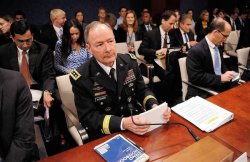 Recently disclosed National Security Agency surveillance programs have helped disrupt more than 50 "potential terrorist events" around the world over the last 12 years, according to U.S. intelligence officials who described the spying operations as tightly regulated and extremely useful.
Recently disclosed National Security Agency surveillance programs have helped disrupt more than 50 "potential terrorist events" around the world over the last 12 years, according to U.S. intelligence officials who described the spying operations as tightly regulated and extremely useful.
The officials, testifying Tuesday before the House Intelligence Committee, identified two new cases — an alleged plot to blow up the New York Stock Exchange, and a U.S. resident who helped finance a terrorist group in Somalia — that they said proved the value of collecting domestic telephone calling records and monitoring foreign Internet traffic.
Most of the plots were foiled by surveillance of foreigners overseas, the kind of spying the NSA has done since it was created in 1952 to monitor communications and other intelligence.
The surveillance programs "are critical to … our nation and our allies' security," said Gen. Keith Alexander, who heads the NSA and the Pentagon's U.S. Cyber Command. "They assist the intelligence community efforts to connect the dots."
He said 10 of the 50 cases had the potential to involve domestic telephone records, but he could not say how many actually did. Civil liberties activists and some members of Congress have called the collection of telephone metadata the most worrisome part of the NSA operation, and questioned whether it violates Americans' privacy.
Details of NSA data collection programs were leaked to news organizations this month by Edward Snowden, a former computer systems administrator at an NSA facility outside Honolulu.
Separately, Google asked the Foreign Intelligence Surveillance Court to lift a long-standing gag order that prevents companies from disclosing information about the requests the government makes for information in national security cases. The company argued that the ban violates its 1st Amendment rights.
The company has said that Snowden's leaks to news organizations greatly overstated the amount of information on its users that the government has access to. The company wants to be able to release information to "respond to false or misleading statements about the scope of its compelled disclosure under national security authorities," its petition says.
Alexander said Snowden worked at the NSA for a total of 15 months as an outside contractor. Snowden was an employee of Booz Allen Hamilton, a consulting firm, for three months early this year, the company said. Snowden worked in 2012 for Dell, according to a government form he signed last year.
Snowden apparently used his access at the NSA to download top-secret documents onto a portable data storage device and spirit them out of the facility. Alexander said the NSA was considering creating a "two-person control" system to prevent anyone from downloading sensitive data without a partner approving it.
Alexander said he would give the House and Senate Intelligence committees a classified list of the plots thwarted by the NSA telephone and Internet programs that Snowden disclosed.
The officials said the NSA archive of domestic telephone calling records was used only for terrorism investigations and espionage cases. Only 22 analysts in the agency's vast workforce are authorized to access the database, and they conducted about 300 queries last year.
Sean Joyce, deputy FBI director, described two terrorism cases that he said the NSA surveillance efforts had helped disrupt.
NSA monitoring of an extremist in Yemen led to his communications with Khalid Ouazzani of Kansas City, Mo., and an alleged plot to bomb the New York Stock Exchange, Joyce said. Ouazzani pleaded guilty in 2010 to providing money to Al Qaeda and to related charges of money laundering and bank fraud.
In another case, Joyce said, the NSA "provided us a telephone number only in San Diego that had indirect contact with an extremist outside the United States." Further investigation led the FBI to uncover a terrorist financing plot in Somalia.
Basaaly Saeed Moalin, a cabdriver in San Diego, and three others were convicted this year of conspiracy to provide material support to a foreign terrorist organization and launder money.
Previously, officials had said the NSA surveillance had played a role in the 2009 arrests of Najibullah Zazi, an Afghan in Denver who later pleaded guilty to planning suicide bombings in the New York subway system, and David Coleman Headley, a Pakistani American from Chicago who was sentenced this year for his role in the 2008 terrorist attacks in Mumbai, India, that killed 166 people.
After the hearing, Alexander said that Snowden, during his NSA orientation, had gained access to the most sensitive document he leaked: an order marked "top secret" from the Foreign Intelligence Surveillance Court.
The warrant "was on a Web server that he as an analyst [had access to] coming into the Threat Operations Center," Alexander said. "It was in a special classified section that, as he was getting his training, he went to."
It wasn't immediately clear whether Snowden copied the document during his training or later.
 Recently disclosed National Security Agency surveillance programs have helped disrupt more than 50 "potential terrorist events" around the world over the last 12 years, according to U.S. intelligence officials who described the spying operations as tightly regulated and extremely useful.
Recently disclosed National Security Agency surveillance programs have helped disrupt more than 50 "potential terrorist events" around the world over the last 12 years, according to U.S. intelligence officials who described the spying operations as tightly regulated and extremely useful.